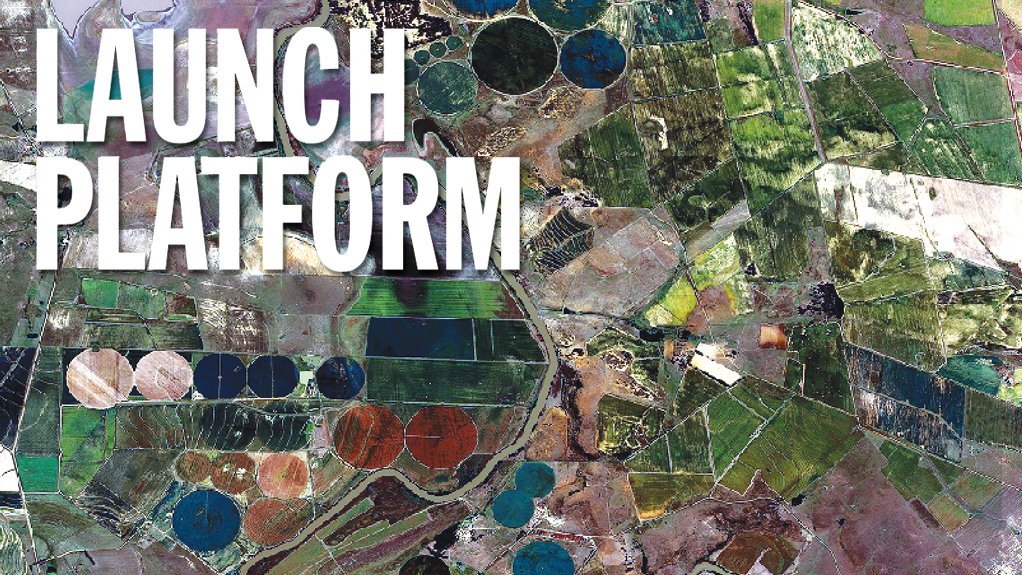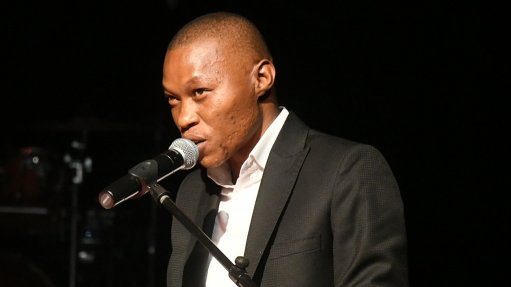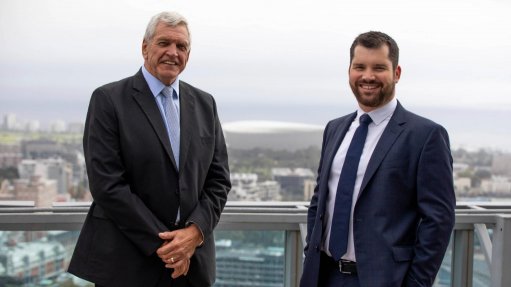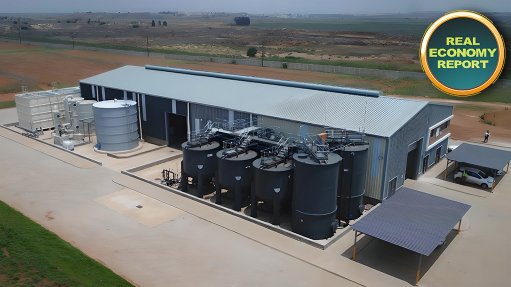New space agency CEO outlines vision for stimulating local space industry
The South African National Space Agency’s (SANSA’s) recently appointed and third confirmed (as distinct from acting) CEO, Humbulani Mudau, is determined to use the solid “launch pad” created under the leadership of his predecessors and take the agency to new heights, both figuratively and literally. All the way into space, in fact.
Foundation
SANSA is organised into five divisions, which it normally calls “programmes”, one of which is its head office, responsible for the “Administration programme”. The operational programmes are Earth Observation, Space Engineering, Space Operations, and Space Science.
Earth Observation uses space to look at Earth. This programme gathers, processes, and both distributes and archives Earth observation data, supplied by satellites, and also uses this data to provide value-added services. Its services and products support socioeconomic development by assisting with environmental and resource management, health and disaster management, and align with both national and global Earth observation strategies. Its products and services are also used for research and development, scientific research, and human capital development.
Space Engineering is focused on the development, assembly and testing of satellite systems and subsystems. Its ultimate aim is to support the development of a South African satellite manufacturing sector, which would also stimulate the development of advanced manufacturing in the country. Again, human capital development is an important part of its work.
Space Operations is currently located at Hartebeesthoek, west of Pretoria. Its function is to provide globally competitive, leading- edge, ground station facilities to support space launches from around the world, international (and, when relevant, national) satellite operations, including tracking, telemetry and control, in-orbit testing, mission control and space navigation. (South Africa has been providing such services since the 1950s.) It also carries out applied research, development and innovation and yet again develops human capital.
Space Science is concentrated at Hermanus, east-south-east of Cape Town, but oversees a network of instruments across South and Southern Africa, as well as on Marion and Gough islands and in Antarctica. It undertakes fundamental and applied research into space physics and geomagnetism. Its facilities include the only “24/7” space weather forecasting centre in Africa (see Engineering News & Mining Weekly December 16, 2022). And, of course, it also develops human capital.
Cross-cutting these programmes is SANSA’s “Space Infrastructure Hub” project. This will be a combination of physical infrastructure and Big Data-driven technologies. Phase 1 of the hub project has been approved and allocated funding, totalling about R1.2-billion over the next two financial years (FYs), by the National Treasury. Of this total, R800-million has been allocated for this FY, with the remaining some R400-million to be disbursed during the next (2024/25) FY. This funding is additional to the agency’s normal funding grant from Parliament, of just over R163-million.
The focus of the Space Infrastructure Hub will be on the development of missions for future South African satellites (an essential prerequisite before a satellite can be designed), the development of satellite communications capabilities, and the development of local satellite navigation augmentation systems (which will increase the accuracy of global navigation satellite systems in South and Southern Africa). It will also support the further development of the Space Weather Centre, to guarantee uninterrupted 24/7 space weather services to the International Civil Aviation Organisation. Additionally, it will contribute to the further development of SANSA’s new deep-space ground station, at Matijesfontein, in the Western Cape province.
“We’ve [also] just completed our first institutional review,” reports Mudau. “A panel of external experts looked at SANSA and compiled a report, with findings and recommendations. This report said that our structure was still relevant, so any adjustments to it, in the coming years, will be just tweaking it, not changing it. The institutional review was also very clear on two SANSA programmes which should be strengthened: Earth Observation and Space Engineering.”
Eye in the Sky
“I consider Earth Observation to be the core programme for SANSA,” he affirms. “It provides data essential to addressing a whole range of the critical challenges facing our country, and essential to helping us deal with extreme events, such as those linked to climate change, like the increasing frequency of severe floods in different parts of the country. So, it’s one of the areas that I will be focusing on, and building capacity.” In addition, to increase its own sources of revenues, SANSA plans to talk to major business sectors, such as mining and banking, to see what Earth observation services and products it could provide them with or develop for them.
Space Engineering is now focused on a national satellite development programme. This is, in fact, closely interrelated with the Earth Observation programme as the objective is to develop, launch and operate a South African Earth observation satellite (or satellites). The satellite can only be designed once Space Engineering’s specialists know what the user requirements are. SANSA Earth Observation is a key provider of such requirements, but not the only one; other government agencies, departments, universities and private-sector business associations also have requirements that have to be considered.
“The satellite development programme needs a very strong internal systems engineering capability, so we’re focusing on developing our capacity,” he explains. The plan is for SANSA Space Engineering to lead and oversee the satellite programme, by providing it with a systems engineering framework. But most of the actual manufacturing work, including the design and production of most (if not all) the satellite’s systems and subsystems, will be carried out by the country’s small but capable private-sector space industry and by local universities with space systems programmes, such as the Cape Peninsula University of Technology (CPUT) and the University of KwaZulu-Natal (UKZN).
A very important step in this satellite programme should take place this year: ownership of the country’s satellite assembly and test facility at Houwteq, south-east of Cape Town, should be transferred from the State-owned Denel defence industrial group to SANSA. This transfer has been agreed to, in principle, between the Department of Science and Innovation (DSI, which oversees SANSA) and the Department of Public Enterprises (which oversees Denel) and has the support of the Minister of Finance. The transfer should be completed by the end of this calendar year.
“This transfer will be critical for the development of the satellite,” he states. “But it will also serve as a developer and accelerator for young researchers and startup companies.” SANSA plans to upgrade Houwteq once it takes control of the facility.
Prelude to Space
The reference to startups is not formulaic. Mudau’s intention is that SANSA, to the best of its ability, stimulates and supports the development of the South African private- sector space industry. That is the approach already adopted by many space agencies around the world, not least the US National Aeronautics and Space Administration (Nasa), with great success.
“We’re going to really look at what our mandate says,” he highlights. “That includes exploiting our space expertise: we can establish companies or institutes that can assist us in our work, or we can invest in such companies. For me, this is a powerful instrument that SANSA has been given in the [SANSA] Act. In the immediate future, we’ll be developing an investment strategy.”
Part of this investment strategy will be to bring private investors into what originated as SANSA programmes. “We’d start with government seed funding and then the private sector would come in, take over, and develop the project.”
One important area in which the private sector could make a decisive contribution is access to space. Or, to phrase it differently, the development of a national space launch capability. “More and more countries are developing their own space launch capabilities,” he stresses. These include Germany, Sweden, the UK and even New Zealand. In every case, these are private-sector initiatives facilitated by public-sector bodies. (In the case of New Zealand, the country hosts a commercial launch facility owned and operated by US Nasdaq-listed company Rocket Lab through its New Zealand subsidiary, which it used to launch its in-house developed Electron rocket, capable of carrying payloads of up to 300 kg into low Earth orbit.)
“Arniston (south-east of Cape Town) is very favourably located for polar orbital launches, and, with almost no air traffic in the area, has almost unlimited launch windows,” he points out. “We believe we can provide such launch services for Africa and for our Brics (Brazil, Russia, India, China and South Africa) partners. However, South Africa does not yet have the legal framework to facilitate the development of private-sector launch capabilities. We, SANSA, need to work closely with the Department of Trade, Industry and Competition, which is now developing a new space industry strategy and is looking at a new Space Act, which would be very important in developing our local private-sector space industry. We’ll also need the necessary regulations to be developed.”
In the interim, SANSA aims to support UKZN in its programme to develop and test sounding (that is, suborbital) rockets. UKZN’s Aerospace Systems Research Institute, with support from the DSI, also has a project (designated SAFFIRE) to develop a liquid- fuelled rocket motor. To date, the UKZN team has successfully flown its Phoenix-1b Mk IIr sounding rocket, in March 2021, and its Phoenix-1D vehicle, in March this year, with a launch of its Phoenix-1C also planned for this year. The Phoenix series are powered by hybrid rocket motors and launched from Denel’s Overberg Test Range (OTR), situated next to Arniston. The Phoenix-1C will carry an experiment from SANSA as well as others from CPUT and a private company. None of the Phoenix rockets have yet reached space. To ensure it can provide continued support to UKZN’s endeavours, SANSA will also take over part of the OTR from Denel.
None of this should be taken to imply any neglect of SANSA’s world-renowned and respected Space Operations programme. This, too, has an exciting future with major developments already under way.
“Space Operations will be supporting deep-space missions,” he enthuses. “The DSI has signed a Letter of Intent to support Nasa’s upcoming lunar missions. SANSA will be part of the Artemis programme, which will return astronauts, including the first woman and person of colour, to the Moon. It’s very exciting for us.”
It is to support Artemis that the new ground station is being constructed at Matjiesfontein. However, SANSA hopes that, in due course, other new facilities will be established there and that Matjiesfontein will, in time, also serve as a backup for Hartebeesthoek.
Things to Come
Mudau also seeks to implant a transformational management culture at SANSA, which would include a culture of closer teamwork and cooperation within the organisation, as well as a tighter focus of meeting the needs of the agency’s customers and clients. This will help ensure that SANSA is a continuously high-performing agency, not only nationally but internationally, and will be the leading space agency in Africa.
“Being a transformational leader means building a team that engages in mentorship and promotes entrepreneurship within the organisation, to encourage innovation, to allow our brilliant engineers to innovate and be rewarded,” he explains. “We want to create a strong corporate culture and to make it an honour to work for SANSA.”
Comments
Press Office
Announcements
What's On
Subscribe to improve your user experience...
Option 1 (equivalent of R125 a month):
Receive a weekly copy of Creamer Media's Engineering News & Mining Weekly magazine
(print copy for those in South Africa and e-magazine for those outside of South Africa)
Receive daily email newsletters
Access to full search results
Access archive of magazine back copies
Access to Projects in Progress
Access to ONE Research Report of your choice in PDF format
Option 2 (equivalent of R375 a month):
All benefits from Option 1
PLUS
Access to Creamer Media's Research Channel Africa for ALL Research Reports, in PDF format, on various industrial and mining sectors
including Electricity; Water; Energy Transition; Hydrogen; Roads, Rail and Ports; Coal; Gold; Platinum; Battery Metals; etc.
Already a subscriber?
Forgotten your password?
Receive weekly copy of Creamer Media's Engineering News & Mining Weekly magazine (print copy for those in South Africa and e-magazine for those outside of South Africa)
➕
Recieve daily email newsletters
➕
Access to full search results
➕
Access archive of magazine back copies
➕
Access to Projects in Progress
➕
Access to ONE Research Report of your choice in PDF format
RESEARCH CHANNEL AFRICA
R4500 (equivalent of R375 a month)
SUBSCRIBEAll benefits from Option 1
➕
Access to Creamer Media's Research Channel Africa for ALL Research Reports on various industrial and mining sectors, in PDF format, including on:
Electricity
➕
Water
➕
Energy Transition
➕
Hydrogen
➕
Roads, Rail and Ports
➕
Coal
➕
Gold
➕
Platinum
➕
Battery Metals
➕
etc.
Receive all benefits from Option 1 or Option 2 delivered to numerous people at your company
➕
Multiple User names and Passwords for simultaneous log-ins
➕
Intranet integration access to all in your organisation





















